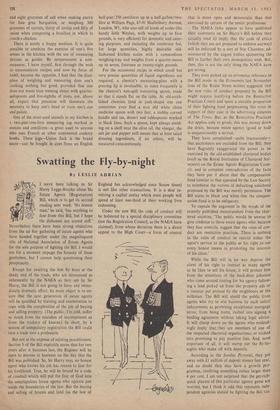Swatting the Fly-by-night
By LESLIE ADRIAN I RAVE been talking to Sir Harry Legge-Bourke about his Estate Agents (Registration) Bill, which is to get its second reading next week. 'No honest man,' he said, `has anything to fear from this Bill, but I hope the dishonest are scared stiff.' Nevertheless there have been strong objections from the ad hoc gathering of estate agents who have banded together under the magniloquent title of National Association of Estate Agents for the sole purpose of fighting the Bill. I would not for a moment impugn the honesty of these gentlemen, but I cannot help questioning their perspicacity.
-Except for swatting the few fly boys at the shady end of the trade, who are denounced as vehemently by the NAEA as they are by Sir Harry, the Bill is not going to have any imme- diately dramatic effect. Its main object is to en- sure that the next generation of estate agents will be qualified by training and examination to cope with the complexities of the job of buying and selling -property. (The public, I'm told, suffer as much from the mistakes of incompetents as from the trickery of knaves.) In short, by a system of compulsory registration the Bill could turn a trade into a profession.
But not at the expense of existing practitioners. Section 5 of the Bill explicitly states that for two years after it becomes law, the Register will be open to anyone in business on the day that the Bill was published. So, Sir Harry says, no honest agent who knows his job has reason to fear for his livelihood. True, he will be bound by a code of conduct which will put the fear of God into the unscrupulous house agents who operate just inside the boundaries of the law. But the buying and selling of houses and land (as the law of England has acknowledged since Saxon times) is not like other transactions. It is a deal in- volving a capital outlay which most people will spend at least one-third of their working lives redeeming, Under the new Bill the code of conduct will be bolstered by a special disciplinary committee (not the Registration Council, as the NAEA have claimed), from whose decisions there is a direct appeal to the High Court—a form of control that is more open and democratic than that exercised by certain of the senior professions.
The NAEA (who appear to have published their comments on Sir Harry's Bill before they actually read it) imply that the code of ethics (which they are not prepared to endorse anyway) will be enforced by a sort of Star Chamber, ad- ministered by the august bodies sponsoring the Bill to further their own monopolistic ends. But, then, this is not the only thing the NAEA have got wrong.
They even picked up an erroneous reference to the Bill made in the Economist last November (one of the Ryder Street writers suggested that the new rules of conduct proposed by the Bill might require justifying before the Restrictive Practices Court) and spent a sizeable proportion of their fighting fund perpetuating this error in support of their case in the advertising columns of The Times. But, as the Restrictive Practices Act applies only to goods, this was money down the drain, because estate agency (good or bad) is unquestionably a service.
They have complained—quite inaccurately— that auctioneers are excluded from the Bill; they have flagrantly exaggerated the power to be exercised by the old-established chartered bodies (such as the Royal Institution of Chartered Sur- veyors) on the Estate Agents Registration Coun- cil; and in complete contradiction of the facts they have put it about that the compensation fund (similar to that operated by the Law Society to reimburse the victims of defaulting solicitors) proposed by the Bill was merely permissive. The Bill states in black and white that the compen- sation fund is to be obligatory.
To capsule the argument in the words of the recently published memorandum from the char- tered societies, 'The public would be unwise to give credence to those estate agents who, because they fear controls, suggest that the rules of con- duct are restrictive practices. There is nothing in the rules of conduct to restrict either the agent's service to the public or his right to use every honest means in promoting the interests of his client.'
While the Bill will in no way deprive the client of his right to instruct as many agents as he likes to sell his house, it will protect him from the attentions of the back-door johnnies who come around touting for his agency follow- ing a lead picked up from the property ads or a rumour put around by the neighbours or the milkman. The Bill will shield the public from agents who try to win business by such unfair inducements as promising exceptional mortgage terms; from being bums, rushed into signing a binding agreement without taking legal advice. It will clamp down on the agents who mislead- ingly imply that they are members of one of the respected chartered organisations; or tricked into promising to pay punitive fees. And, most important of all, it will stamp out the fly-by- nights who make off with deposits.
According to the Sunday Pictorial, they got away with £1 million of deposit money last year, and no doubt they also have a growth pro- gramme, involving something rather larger than 4 per cent. I am 'not surprised that the get-rich- quick players of this particular agency game are worried, but I think it odd that reputable inde- pendent agencies should be fighting the Bill too.


































 Previous page
Previous page